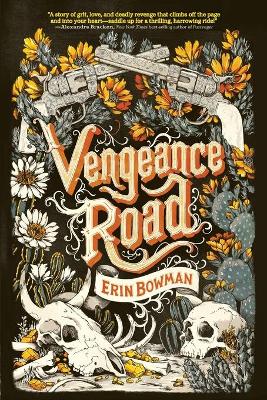Reviewed by nannah on
Book content warnings:
ableist language
racism (in particular, anti-indigenous racism)
fatphobia (one part)
This book was a mess, I'm sorry. The plot is annoyingly simple and I was never able to become as interested in it as any of the characters were, which left me distanced from it. The writing also . . . is a mess.
What this book is trying to sell you is the story of Kate Thompson and her quest for revenge. Her father has been killed by the famous Rose Riders, and she'll do anything - literally anything - to chase them down and return the favor.
Now I understand this is supposed to be a fun Western, but the dialogue and prose (because the two are inseparable as far as the style go) are so full of cliches it's somewhat hard to read:
"You know who did it?" Jesse asks
"Yep. A gang goes by the Rose Riders."
"That's Waylan Rose and his boys! You can't be serious, Nate."
"More serious than a rattler shaking."
It might have to do with the fact that the writing relies on the dialect far to much. Without it, you realize how poor the writing actually is. I mean, dialect can be a great asset, but it has to be used like one or else it's really transparent how much of a gimmick it is.
The dialect is actually written out in misspelled words (like "yer" and "'cus", which doesn't make sense either, being that Kate can read well. Unlike Patrick Ness's The Knife of Letting Go, where the voice reveals something about the protagonist, who couldn't read and was largely uneducated and ignorant about a lot of things plotwise, this "voice" is here just to add glitter and pizazz to lackluster writing. (Besides, there's also inconsistency with the voice. Liluye doesn't have this particular dialect, but then--sometimes, she does. Only a few words, and probably then, an accident.)
But what's definitely not an accident . . . is the very deliberate racism and fatphobia. I can't believe there are books being published in 2015 that still have this much ick in them. Let me give you an example:
". . . two wide men and a lady wider than the both of 'em put together. [. . .] Josie hops from the piano and hits the floor boards with a thunder. By the time she saunters up to me, I's decided that she could kill me by sitting on me."
And that's just by page 23. There's so much more nastiness hiding inside this book. I gave this author a chance, and she spat on me.
The racism. The anti-Indigenous racism in particular. It's so bad. I can imagine the author writing this with good intent and that's when I just want to shake my head in second-hand embarrassment. Now, the MC is biracial, with a Mexican mother and a white father. That's pretty cool, except that the mother turns out to be the Biggest Bad of all, and Kate has thoughts about Not Wanting to Be Like Her and wanting to be like her father only, and with the number of poc being slim here, this really isn't good.
The tone throughout the book is very anti-Indigenous in general. Sure, there's the time period to consider, but one has to recognize your readers and their market today. If you are an author, and you're writing for YA readers, it's your responsibility as an author to write things that are responsible for children to read. Not just white children, either . . . and they're going to read things like:
"The river that flows upside down. I ain't fond of having to follow it. Indians like the water. Crooks like the water. Trouble likes the water."
Ah yes, to be likened to crooks and trouble. There are also Native American slurs and Native Americans being treated like slaves and like dirt.
But there's a Native American character! Yes, but representation doesn't always equal a better book. Especially if the representation is bad representation.
The way the author tries to combat the racist tone she's established so far is to be colorblind:
"The Apache. Only, she don't look so much like an Apache anymore, but just a scared girl."
Colorblindness isn't actually respecting a person of color. And the MC saving her doesn't mean she's not racist. Especially since Liluye (the Native American character) tells Kate (the MC) her name, and Kate gives her a nickname: Lil. Liluye corrects her, saying that "Lil" isn't her name, but Kate continues to call her Lil and ignores all further corrections. The ONLY time Kate uses her actual name is when Kate needs her help, and then she regrets not knowing how to say her name.
There's also an air of "exoticism" present around Liluye that's incredibly disrespectful to Native Americans. It seems whenever there's an indigenous character in any medium, they're the shaman or something the MCs go to when they need a spell or if there's a curse, etc. etc. etc. Here there's just always a mention about how "magical" Liluye is compared to Kate and the other characters:
"It's like she's everywhere, that girl. In the earth and the sky and the dry Arizona air. I remind myself to never cross her."
As far as everything else goes, the book is readable, the plot fairly straightforward. The plot points are predictable. The climax fell flat for me and was over way too fast. In fact, I think a couple lines from the book can sum up my feelings about the climax and the book as a whole:
"It's over. It happened so fast and I don't know what to do with myself. I feel surprisingly empty."
Me too, Kate. Me too.
Reading updates
- Started reading
- 6 April, 2016: Finished reading
- 6 April, 2016: Reviewed
